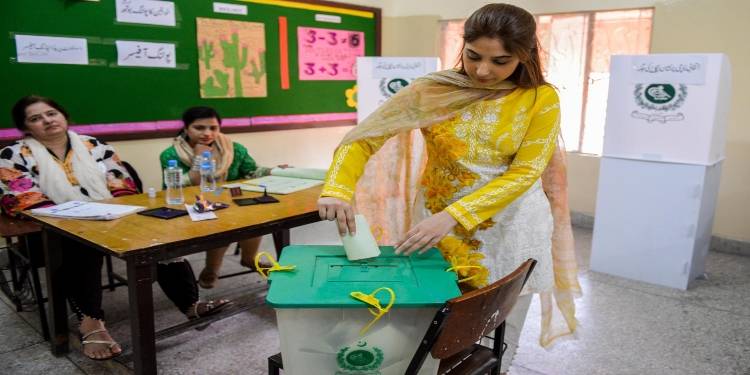
The federal government has apprised the Supreme Court (SC) that conducting free and fair elections for the National Assembly (NA) in the presence of elected provincial governments in the provinces of Punjab and Khyber Pakhtunkhwa may not be possible.
On Twitter, a senior court reporter said that the federal government informed the Supreme Court of its concern through a concise statement.
Chief Justice of Pakistan Umar Ata Bandial took suo moto notice of the delay in elections in the Punjab and Khyber Pakhtunkhwa assemblies. But since then, there has been a clear division among judges over the matter.
Many judges have recused themselves from hearing the case, and the bench that constituted the case has now shrunk to a three-member bench, which was earlier a five-member bench.
On April 1, the government coalition expressed ‘no confidence’ in the three-member SC bench hearing PTI’s petition against Punjab's election delay.
The bench led by Chief Justice Umar Ata Bandial and comprising Justice Ijaz-ul-Ahsan and Justice Munib Akhtar is hearing the plea against the ECP’s postponement of the polls to October 8.
In a statement issued after the meeting, the coalition leaders asked the top court to end the proceedings in view of the four-member majority decision reached in the earlier suo motu hearing.
They lamented that CJP Bandial "wants to impose the decision of the minority on the verdict of the majority."
"This approach wouldn’t only create a constitutional and legal crisis in the country, but is also an example of deviation from the Constitution and the established legal norms," the communiqué said.
The coalition leaders added that the approach is also against the basic concept of the distribution of powers within the state.
A day earlier, the three-member SC bench turned down AGP Mansoor Awan’s request to form a full court to hear the petition.
According to the court, the law or the rules don’t support the composition of a full court, and doing so would take the matter back to its start.
The judge also ‘disregarded’ the order issued by Justice Qazi Faez Isa and Justice Aminuddin Khan on his suo motu powers and said it violates the rules laid down by a five-member larger bench.
On Twitter, a senior court reporter said that the federal government informed the Supreme Court of its concern through a concise statement.
Chief Justice of Pakistan Umar Ata Bandial took suo moto notice of the delay in elections in the Punjab and Khyber Pakhtunkhwa assemblies. But since then, there has been a clear division among judges over the matter.
Many judges have recused themselves from hearing the case, and the bench that constituted the case has now shrunk to a three-member bench, which was earlier a five-member bench.
On April 1, the government coalition expressed ‘no confidence’ in the three-member SC bench hearing PTI’s petition against Punjab's election delay.
The bench led by Chief Justice Umar Ata Bandial and comprising Justice Ijaz-ul-Ahsan and Justice Munib Akhtar is hearing the plea against the ECP’s postponement of the polls to October 8.
In a statement issued after the meeting, the coalition leaders asked the top court to end the proceedings in view of the four-member majority decision reached in the earlier suo motu hearing.
They lamented that CJP Bandial "wants to impose the decision of the minority on the verdict of the majority."
"This approach wouldn’t only create a constitutional and legal crisis in the country, but is also an example of deviation from the Constitution and the established legal norms," the communiqué said.
The coalition leaders added that the approach is also against the basic concept of the distribution of powers within the state.
A day earlier, the three-member SC bench turned down AGP Mansoor Awan’s request to form a full court to hear the petition.
According to the court, the law or the rules don’t support the composition of a full court, and doing so would take the matter back to its start.
The judge also ‘disregarded’ the order issued by Justice Qazi Faez Isa and Justice Aminuddin Khan on his suo motu powers and said it violates the rules laid down by a five-member larger bench.

